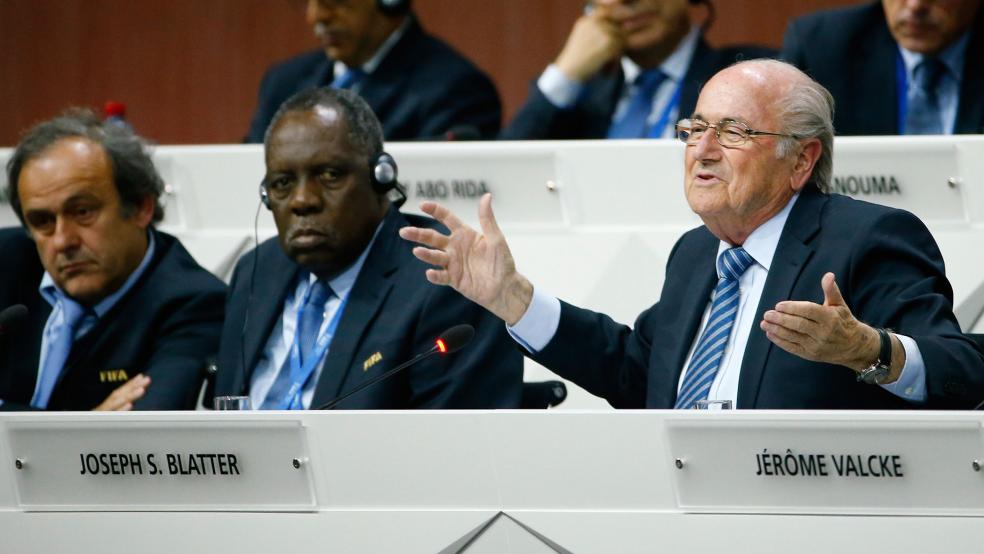Sepp Blatter survives. The 79-year-old president of FIFA was elected Friday to a fifth four-year term, extending his already 17-year-long reign as the head of the global soccer organization.
His victory came after his challenger, Prince Ali Bin al-Hussein of Jordan withdrew from the running — and despite the massive scandal the organization now faces after the arrest of 14 officials on corruption charges.
Blatter’s victory comes despite the calls by the various leaders of European and American soccer organizations demanding his resignation in the wake of those charges. It comes despite the Tammany Hall-esque corruption of his administration being the single worst kept secret in perhaps the whole world. It comes despite the 1,200 and counting deaths in Qatar of foreign workers building their own Tower of Babel for the 2022 World Cup.
The greatest threat to Blatter’s leadership that FIFA has ever seen was still hardly a threat at all.
Related: FIFA Executives: Terrible People, Worse Criminals
How and why does Blatter keep winning?
First of all, it is important to understand what Blatter considers (or at least vocally declares) to be his greatest accomplishment as FIFA president: the broadening of the organization beyond the traditional Western powers.
During Sepp’s reign, he has brought the first World Cup to Asia, with Japan and Korea hosting in 2002. He has brought the first World Cup to Africa, with South Africa hosting in 2010. The 2022 Cup, should it proceed as planned, will be the first time the tournament will be held in the Middle East. And it is these (seemingly) egalitarian accomplishments that Blatter trots out to defend himself against allegations of corruption.
These seemingly inviting policies that have enabled Sepp to keep his grip on the throne. Under Blatter, the membership of FIFA has grown to 209 nations (15 more than the United Nations). By setting up a system of “one country, one vote,” Blatter ensured that Easter Island has the same amount of power as England or Brazil. The Faroe Islands, a nation of 49,000, has the same voting power as the United States. For point of reference, the Brooklyn neighborhood of Park Slope alone has 65,000 people.
Related: Why the FIFA Crackdown Took the World by Surprise
In effect, Blatter has been able to survive by pursuing an electoral strategy, similar to the way an American presidential candidate can lose the popular vote but win in the electoral college, or lose New York and California as long as they win the South and Ohio. Sepp doesn’t need Germany as long he can get Guyana and Guatemala.
Now on paper, this seems like a victory for the little guy. The view of Blatter as a tyrannical and corrupt despot is a particularly Western view. To the smaller nations, both in terms of population or economic standing, he is a kind of Robin Hood figure, challenging the dominance of the West and bringing largess to the lowly nations. And it’s very hard to argue with that narrative.
Unfortunately, that narrative does ignore a few inconvenient facts. First, there is the corruption factor. Some of the nations supporting Blatter are, for better or worse, used to a style of governing that involves bribery and coercion. To many of them, the charges against Blatter are just persecution for his doing business in a way that many see as normal. To them, this investigation is an attempt by the powerful to retain control.
Then there is the question of exactly who the World Cup belongs to — and whether the egalitarian ideal of any country being able to participate in or even host the games matches up with the reality of a sport fueled by multinational corporate sponsors.
From a distance, Blatter’s talk of uniting the world on the soccer pitch has appeal. The World Cup, like the Olympics, is one of the few events that can bring almost every country together. But as Simon Kuper pointed out in his spectacular book Soccernomics, the World Cup is more often than not a money pit for the host nation. South Africa 2010 was a huge win for FIFA and the various multinational corporations that hosted it, but not so for the local merchants and the local fans who were pushed to the side in favor of their “betters.”
Related: Why the U.S., of All Countries, Stepped up to Save Soccer
The reality of a World Cup is that those that can afford it will travel to it, and buy the tickets. They will stay in a hotel chain that is probably headquartered in the U.S. They will buy soccer apparel made by Nike or Adidas and branded by FIFA. And they will drink beer that is probably made and owned by a European company (remember, that includes Budweiser now).
That last point, though, may result in more pressure on Blatter than any other part of this whole FIFA scandal. For all the talk of joining hands with the world, Budweiser doesn’t want to sponsor a tournament in a nation that can’t drink. Visa doesn’t want to sponsor a tournament in a nation where homosexuality is criminalized. Nobody wants to support a tournament in a country that’s about to invade Ukraine.
Blatter has been reelected. Whether he serves the rest of his term remains to be seen, but at the end of the day it may not be the FBI or the Swiss authorities that bring him down. As Blatter and his FIFA colleagues well know, money makes the world go 'round.
Top Reads from The Fiscal Times:




